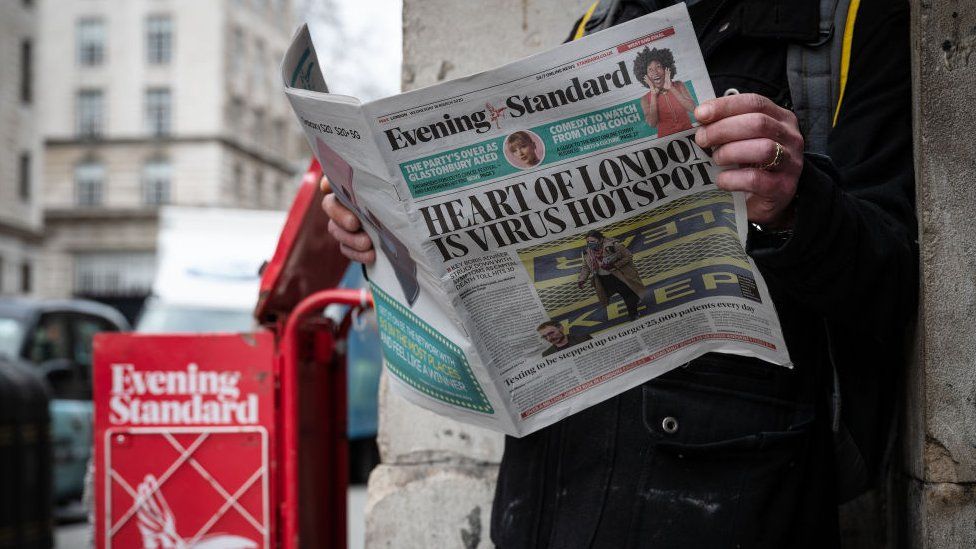ARTICLE AD BOX
 Image source, Getty Images
Image source, Getty Images
By Sam Francis
Political reporter, BBC News
The government must come clean over a Covid-era advertising campaign, after Dominic Cummings claimed Boris Johnson had "bunged" money to friendly newspapers, the Lib Dems have said.
Mr Cummings said state funding had been "funnelled" to the Evening Standard, owned by an ally of the then-PM.
The Lib Dems have called for "full transparency" of contracts to publish public health messaging in newspapers.
A government spokesperson said "no title received preferential treatment".
But Mr Cummings, who was the prime minister's chief adviser at the height of the pandemic, told the Covid Inquiry he was concerned about "possible corruption" related to money given by the government to the Evening Standard.
In his witness statement to the inquiry, Mr Cummings said he overheard Mr Johnson telling a senior official he wanted to "bung money" to long-time ally Lord Evgeny Lebedev, owner of the Evening Standard.
This money was "part of a general bung to the media", Mr Cummings added.
Mr Johnson has been approached for comment.
After being approached for a comment, Lord Lebedev asked why the BBC did not focus on what the entire news media sector received during the pandemic and the proportion the Evening Standard received.
The Cabinet Office has refused to release detailed breakdowns of how the £35m "all in, all together" fund was spent.
The scheme was set up in April 2020 to buy advertising space in UK print media for government public health messaging during the pandemic.
At the time newspaper revenues were falling due to a drop in circulation and footfall as Covid spread.
Deputy leader of the Liberal Democrats, Daisy Cooper, said: "It was absolutely right the government used newspapers to get out vital public health messages during the pandemic.
"But given the PPE [personal protective equipment] contract debacle, we need to see full transparency in these deals."
During the pandemic, the government awarded thousands of contracts to private companies, spending billions of pounds of public money.
But the way these contracts were awarded led to accusations of a lack of transparency and concerns about wasting taxpayer money on defective PPE.
Image source, EPA
Image caption,Dominic Cummings served as Boris Johnson's senior adviser between 2019 and 2020
Government figures show the "all in, all together" scheme paid money to more than 600 newspapers - most of which were regional titles - and more than 300 websites.
However, the government has not released a breakdown of how much each publication received.
All of the titles were selected independently by the government's arm's-length media agency OmniGOV.
There have been allegations, first reported by the Byline Times, the scheme disproportionately funded news publishers that supported the Conservative Party.
The scheme followed intense lobbying from the News Media Association (NMA). In March 2020, the trade body for local and national press warned some publishers "would not survive beyond the next few months without swift intervention".
At the same time, George Osborne, the former Tory chancellor and then editor of the Evening Standard, "had been begging for cash" from the prime minister, Mr Cummings said.
Mr Cummings also alleges Mr Johnson met with Lord Lebedev in the days before the scheme was launched.
Mr Johnson has been friends with Lord Lebedev since his time as mayor of London.
Lord Lebedev, who also owns the Independent newspaper, was nominated for a peerage in July 2020 by Mr Johnson and sits as a crossbench peer.
Image source, Getty Images
Image caption,As London mayor Boris Johnson, pictured in 2009, socialised with Evgeny Lebedev
Mr Osborne called the allegations "nonsense".
Speaking on his Political Currency podcast he said: "Everything's a conspiracy for [Mr Cummings] and always has been."
Hacked Off, a group which campaigns for press accountability, have called for the Covid inquiry to look into the "all in, all together" scheme as part of its investigation of government procurement during the pandemic.
Nathan Sparkes, Hacked Off's chief executive, said: "Millions of pounds of taxpayers' money was handed over to powerful, wealthy and unregulated newspapers in 2020, in an agreement reportedly made directly between politicians and the corporate press lobby group the 'News Media Association'.
"The government has no business making behind closed-door deals with this body."
A government spokesperson said: "The government recognises the valued role of all national, local and regional newspapers, and actively supported the whole industry during the Covid pandemic.
"All outlets were selected by our external media planning and buying agency purely on their ability to engage with audiences at a national, regional and local level, in order to help deliver key public safety messages during the pandemic."

 1 year ago
21
1 year ago
21








 English (US)
English (US)